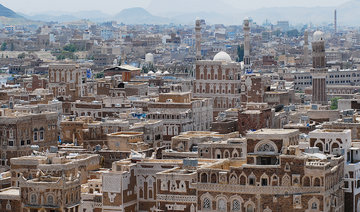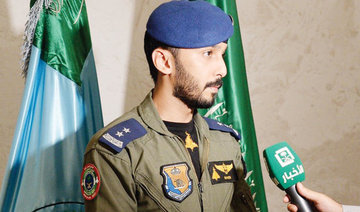When a Royal Saudi Air Force jet ran into mechanical problems in the skies over northern Yemen, the crew were forced to eject in hostile territory. What followed was a difficult and complex rescue mission that tested the bravery and professionalism of the RSAF personnel to the limits. This exclusive account was given to Arab News by sources with inside knowledge of the mission.
JEDDAH: Everything seemed to be going smoothly when Capt. Fahd bin Mohammed Al-Haqbani and his co-pilot Capt. Abdullah bin Hamad Al-Zir crossed into Yemeni airspace.
It was the middle of the afternoon on Jan. 7 and the crewmen were flying their Tornado jet on a combat mission as part of the Arab coalition fighting Houthi rebels.
Their progress was being monitored by members of the Royal Saudi Air Force (RSAF) at King Khalid Air Base near Khamis Mushait. Little did the staff know that the next half hour was going to turn into a battle for the men’s survival.
At 3:26 p.m., the base picked up a signal from the warplane. The Tornado had suffered a technical fault with its oxygen system. Without an oxygen supply to the cockpit, the pilots faced the potentially fatal risk of suffocation or passing out.
Further signals to the air base came from the seat of the pilot, Al-Haqbani. It told the staff at King Khalid Air Base that the two men had ejected. Three seconds later, their jet disappeared from the ground crew’s radar screens.
It is hard to know what the pilot and co-pilot would have been thinking as they drifted down toward the ground in Saada province, a remote and mountainous part of Yemen controlled by Houthi militants.
The Iran-backed rebels seized the capital, Sanaa, in 2014, plunging the country into chaos and sparking the war. The group would show little mercy to two pilots from Saudi Arabia, which has led the bombing campaign to defeat the Houthis and restore the internationally recognized government.
Back at King Khalid Air Base, the ground controller who had received the signals immediately informed his colleagues that something was wrong.
The atmosphere inside the control room was tense and the staff anxious about the crew’s fate.
The information that one of their jets had gone missing was passed up the chain to the relevant authorities and a detailed rescue plan was immediately drawn up based on the worst-case scenario — that the two men had been captured by hostile forces.
The rescuers were aided by the fact that Al-Haqbani, an experienced and respected pilot, had activated a transmitter, which would continue to send signals for more than 24 hours.
The task of carrying out the mission fell to Rescue Squadron 99, part of the RSAF based at King Khalid Air Base. The squadron specializes in conducting rescue operations in war zones and hostile territories.
The team sprung into action knowing that this was not one of the many simulated recoveries which they had practiced over and over. This squadron includes an attachment of highly skilled Marines.
“This is your day,” the squadron leader shouted to his colleagues as they raced to get ready.
The team raced to their state-of-the-art Cougar Combat Search and Rescue helicopters with only one thing on their minds: Rescuing their comrades safely from the enemy and bringing them back home.
The Cougars can carry 20 passengers, can be refueled in the air and are equipped with heavy weapons, including a rocket launcher and two heavy machine guns.
The rescue operation was led by the commander of King Khalid Air Base, Maj. Gen. Mohammed Al-Fa’iz. He ordered two F15c fighter jets to the crash site to provide air cover. The plan was to make the enemy think that air strikes were on the way to scare them off and force them to hide while the rescue operation took place.
Apache attack helicopters were also sent to protect the rescue team and another six F15 fighter jets were also sent to the site, one of which arrived minutes before the rescue helicopters.
Soon after arriving in the area, the F15 pilot picked up the signal from Al-Haqbani, and managed to establish communication with him through the advanced equipment in the Tornado’s ejection seats.
The news that Al-Haqbani had not only survived but was not yet in the hands of the enemy was met with overwhelming joy back at the air base. He managed to relay his exact position to his rescuers.
Al-Haqbani suffered fractures to his hand and foot but his immediate concern was for his co-pilot Al-Zir.
After ejecting, Al-Zir had parachuted down to the top of a mountain. Al-Zir was spotted by one of the Cougar helicopters after he signaled for their attention. The Marines on board the helicopter managed to reach him and get him to the aircraft.
With the two men onboard the helicopters, and headed toward Saudi territory, the rescuers sent a message to base saying the “two pilots are in the basket.”
In total, it took just 20 minutes from the initial warning signal for Rescue Squadron 99 to locate and collect the two airmen.
A sense of relief and joy spread through the rescue crews and the team members at the air base.
Throughout the operation, the RSAF’s advanced surveillance network ensured the skies around the area of the rescue remained safe.
The rescuers crossed the border into Saudi Arabia and arrived in Najran at 5:50 p.m. — less than two and a half hours after the alarm was sounded.
During their return, one of the Cougar helicopters was targeted with ground fire but was not damaged.
The rescued pilots were taken to Najran hospital for treatment.
The Houthis tried to falsely claim they had shot down the aircraft but the truth was that a technical fault in a highly sophisticated warplane had caused the pilots to eject.
What unfolded thereafter was a test of the professionalism, experience and training of the RSAF personnel that will be written into Saudi military history.



























